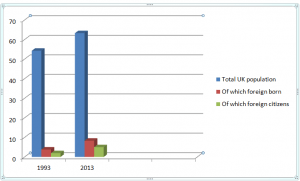…and I didn’t have one!
I moved to the UK almost 29 years ago. Now married an Englishman, I have British children and a British grandchild. I danced with a Morris side for 10 years, culminating in me being made squire (as squire you get to boss about your fellow dancers – only they wouldn’t listen ;-)).
In the past, I considered, but ultimately decided against, applying for a British passport. I simply could not see the need. As an EU national, what difference did it make whether I had a British passport or not?
Would it change my social standing?
Most of the people in my social circle are over fifty and white British. They are not interested in what passport I hold. I am the lady with that bit of a funny accent that they can’t quite place. Might be Dutch, might be German. Becoming British would not get rid of the accent, so it would make no difference.
Being able to vote
The only difference that I could see was being able to vote.
However, the British system of “first past the post” means that in a national election only the candidate with most votes wins in a particular area. All other votes are discarded, even if they were 49.99% of the total. I did not bother with the passport as due to my voting preference (Green), my vote would always have been wasted in whichever constituency I have lived to date.
23 June was a wake-up call
The majority of British voters decided that Britain should leave the EU.
The one time where my vote would have counted – and I didn’t have one!
I wonder: how many foreign nationals who qualify for British passports have not bothered to apply? They might not have felt the need, found it too expensive or they simply wanted to hold on to the nationality they were born into?
Let’s have a look at some statistics.
In 1993 the UK had 54.28 m inhabitants, 3.8 m were foreign-born, 51% of these foreign-born inhabitants did not have a British passport.
In 2013 the UK had 63.27 m inhabitants, 8.3 m were foreign-born and of this group, over 60% did not have British citizenship. (Figures supplied by the ONS.)

What if all long-term migrants had applied for British Citizenship in time for the referendum?
I do not know how many foreigners have lived here long enough to apply for a British passport and how many are not planning to return to their countries of origin. I expect some foreigners live in Britain for a few years only. They come to study, on secondment, for work experience etc. but always knowing they would eventually go home. Then there are the ones who may want to stay forever but who must wait until they’ve been here long enough to apply.
Just think, in 2013 there were 5 million foreign citizens in the UK, most of whom would have been in the country a while. By now there are probably even more as these statistics are three years old.
Consider these figures for a moment: in the five years between 2009 and 2013, as many as 2.56 million immigrants entered the UK. At the same time, 1.57 million left. This leaves us with a net inward migration of 987,000 for that period.
Let’s assume that the majority of these immigrants have not lived in the UK long enough to be eligible to apply for British citizenship. So we deduct the relatively recent immigrants (2.56 million) from the total number of immigrants with foreign citizenship (approx. 5 million). That would leave 2.44 million foreign nationals who would qualify for British citizenship on length-of-stay grounds.
If only half of these eligible individuals had applied for British citizenship, that would have added 1.22 million votes to the referendum.
The ONS has figures about the nationality of immigrants entering the country. In the five years between 2009 and 2013, the proportion of EU citizens compared to non-EU citizens coming to the UK was 38% to 62%.
Could they have made a difference?
I cannot know how any of these people would have voted had they been able to, however, I would assume that the European immigrants would have largely voted to remain. Immigrants from non-EU countries would not have fallen for the “let’s keep immigrants out” slogans that fuelled the leave campaign. So I would guess that the majority of these votes would have gone to the “remain” campaign.
This means that had long-term immigrants had a vote in the referendum, the result might have been different. Remember, the leave campaign won by 1.269 million votes. A smaller margin between the yes and the no camps might have thrown the result into doubt.
So why are foreign-born people living in the UK reluctant to become British?
I have no data on this but I assume that some, like me, can’t see the need. What advantages does British citizenship bring, especially to EU nationals?
I suspect that the high fees associated with becoming a British citizen put off a lot of potential applicants. The application form is 31 pages long, the minimum cost is about £1,200 plus various “incidental costs” which can add £500 or more to the bill. The government charges per person. I believe that, years ago, there was a family application. No more.
Then there is the hassle of having to prove one’s knowledge of English and the citizenship test and lots of other bureaucratic hurdles one has to jump. (More of those in future blog posts.)
So you can see how people are put off applying.
Still, I have come to the conclusion that I shall apply to become a British citizen. I want to have a vote next time Britain is to make a life-changing decision that will affect me in more ways than one.
